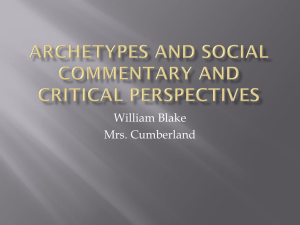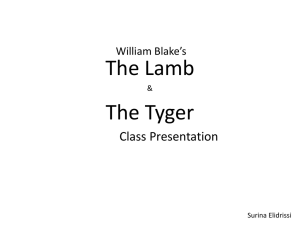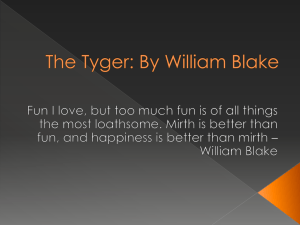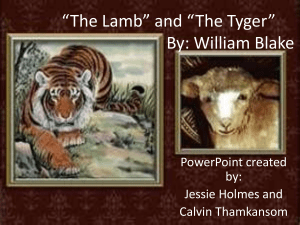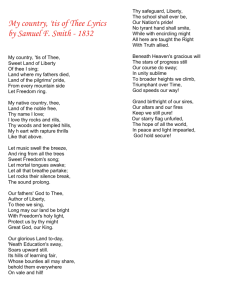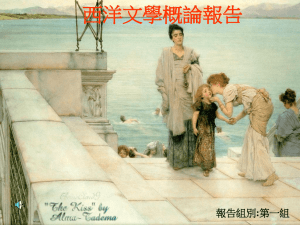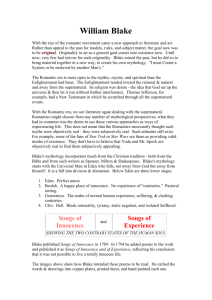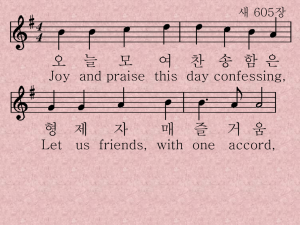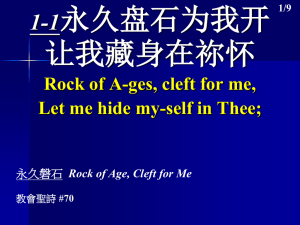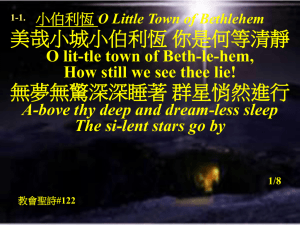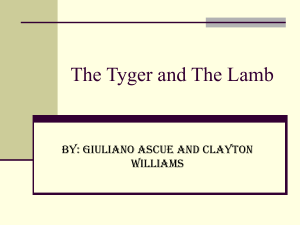WILLIAM BLAKE (1757
advertisement
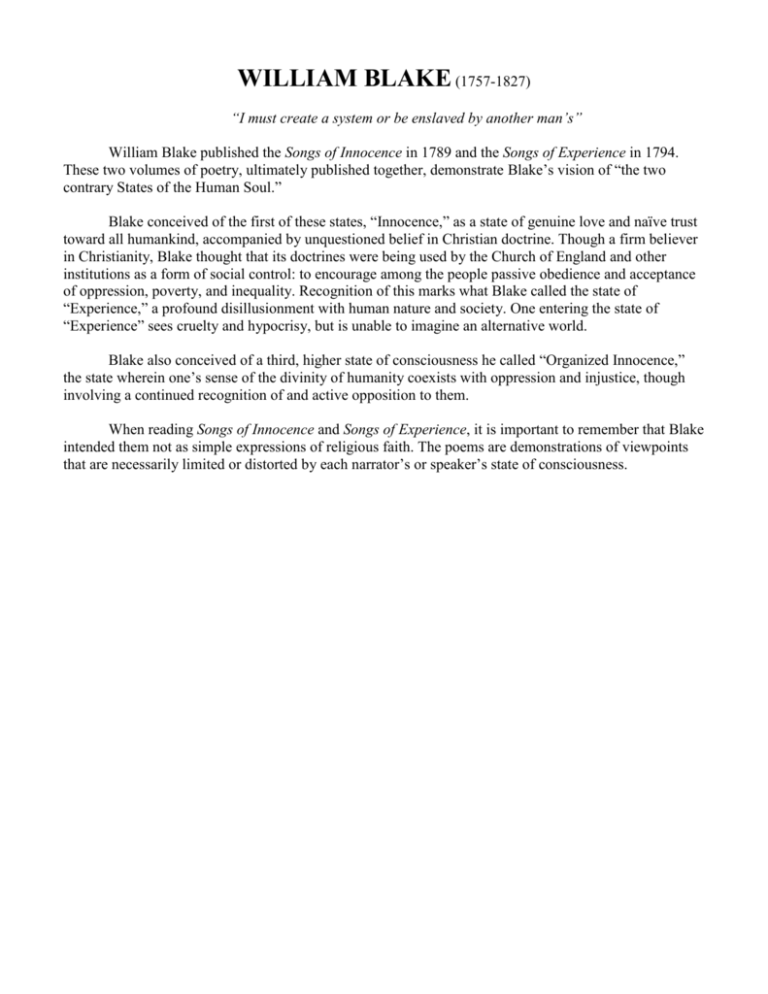
WILLIAM BLAKE (1757-1827) “I must create a system or be enslaved by another man’s” William Blake published the Songs of Innocence in 1789 and the Songs of Experience in 1794. These two volumes of poetry, ultimately published together, demonstrate Blake’s vision of “the two contrary States of the Human Soul.” Blake conceived of the first of these states, “Innocence,” as a state of genuine love and naïve trust toward all humankind, accompanied by unquestioned belief in Christian doctrine. Though a firm believer in Christianity, Blake thought that its doctrines were being used by the Church of England and other institutions as a form of social control: to encourage among the people passive obedience and acceptance of oppression, poverty, and inequality. Recognition of this marks what Blake called the state of “Experience,” a profound disillusionment with human nature and society. One entering the state of “Experience” sees cruelty and hypocrisy, but is unable to imagine an alternative world. Blake also conceived of a third, higher state of consciousness he called “Organized Innocence,” the state wherein one’s sense of the divinity of humanity coexists with oppression and injustice, though involving a continued recognition of and active opposition to them. When reading Songs of Innocence and Songs of Experience, it is important to remember that Blake intended them not as simple expressions of religious faith. The poems are demonstrations of viewpoints that are necessarily limited or distorted by each narrator’s or speaker’s state of consciousness. “The Lamb” from Songs of Innocence Little Lamb who made thee? Questions for “The Lamb” Dost thou know who made thee? What is the tone of the first two lines? How does the tone differ from that of “The Tyger”? Gave thee life & bid thee feed. By the stream & o'er the mead; Gave thee clothing of delight, 5 Softest clothing wooly bright; Gave thee such a tender voice, How does the second stanza respond to the question posed in the first? Making all the vales rejoice! Little Lamb who made thee Dost thou know who made thee 10 How is the lamb both a literal object and a symbol in this poem? Little Lamb I'll tell thee, Little Lamb I'll tell thee! He is called by thy name, For he calls himself a Lamb: He is meek & he is mild, 15 He became a little child: How does the speaker of “The Lamb” differ from the speaker in “The Tyger”? Why do you think the questions in “The Lamb” receive answers? I a child & thou a lamb, We are called by his name. Little Lamb God bless thee. Little Lamb God bless thee. What do you think that line 18 means? 20 “The Tyger” from Songs of Experience Tyger! Tyger! burning bright Questions for “The Tyger” In the forests of the night, What is the setting of the poem according to the first stanza? What mood does this help to create? What immortal hand or eye Could frame thy fearful symmetry? In what distant deeps or skies 5 What question does the speaker ask the tiger in the first stanza? Burnt the fire of thine eyes? What contradiction is present in the term “fearful symmetry”? On what wings dare he aspire? What the hand dare sieze the fire? What does the word choice in line 10 suggest about the nature of the tiger? And what shoulder, & what art. Could twist the sinews of thy heart? 10 What does the word choice in line 12 suggest about the nature of the tiger’s maker? And when thy heart began to beat, What dread hand? & what dread feet? In the 4th stanza what extended metaphor is used to describe the creation of the tiger? What the hammer? what the chain? In what furnace was thy brain? What the anvil? what dread grasp 15 Blake uses both pagan and Christian symbols. In early Christianity stars were thought to be angels. What might stanza 5 allude to? Dare its deadly terrors clasp? William Blake interpreted the world to be filled with symbols; and he believed that everything possessed a spiritual meaning. What do you think they main symbol of this poem means? When the stars threw down their spears, And watered heaven with their tears, Did he smile his work to see? Did he who made the Lamb make thee? 20 What philosophical question does the speaker pose at the end of stanza 5? Tyger! Tyger! burning bright In the forests of the night, What immortal hand or eye Dare frame thy fearful symmetry? How do the first and last stanzas differ? What is the significance? Why do you think the speaker’s question remains unanswered? “The Chimney Sweeper” from Songs of Innocence When my mother died I was very young, Questions for “The Chimney Sweeper”-- SoI And my father sold me while yet my tongue Could scarcely cry " 'weep! 'weep! 'weep! 'weep!" What mood does the first stanza help to establish? So your chimneys I sweep & in soot I sleep. There's little Tom Dacre, who cried when his head 5 How does using the word “your” in line 4 have an impact on the reader? That curled like a lamb's back, was shaved, so I said, "Hush, Tom! never mind it, for when your head's bare, You know that the soot cannot spoil your white hair." What is symbolic about the simile used to describe Tom in stanza 2? And so he was quiet, & that very night, As Tom was a-sleeping he had such a sight! 10 If Tom is “little” what symbolic reason would the poet have for calling his hair white not blonde in stanza 2? That thousands of sweepers, Dick, Joe, Ned, & Jack, Were all of them locked up in coffins of black; And by came an Angel who had a bright key, Explain the symbolism in line 12. And he opened the coffins & set them all free; Then down a green plain, leaping, laughing they run, 15 And wash in a river and shine in the Sun. How does the angel comfort Tom in his dreams? What moral lesson does the speaker draw from Tom’s dream? Then naked & white, all their bags left behind, They rise upon clouds, and sport in the wind. And the Angel told Tom, if he'd be a good boy, He'd have God for his father & never want joy. And so Tom awoke; and we rose in the dark 20 How does Tom’s dream contrast with the actual conditions of his daily life? What details of the speaker’s life do you learn in this poem? What is his present life like? And got with our bags & our brushes to work. Though the morning was cold, Tom was happy & warm; So if all do their duty, they need not fear harm. How does the speaker feel about his situation? How do you feel about it? “The Chimney Sweeper” from Songs of Experience A little black thing among the snow, Questions for “The Chimney Sweeper” -- SoE Crying "weep! 'weep!" in notes of woe! "Where are thy father and mother? say?" What symbolic image is created by the first line? "They are both gone up to the church to pray. Because I was happy upon the heath, 5 Where are the boy’s parents? And smil'd among the winter's snow, They clothed me in the clothes of death, What are his “clothes of death”? And taught me to sing the notes of woe. And because I am happy and dance and sing, They think they have done me no injury, Whom does the chimney sweeper blame for his misery? 10 And are gone to praise God and his Priest and King, Who make up a heaven of our misery." How would you describe the boy’s tone? How does the speaker’s attitude toward his life and his parents contrast with the attitude of the speaker in the first poem? What do you think Blake’s political views are based on this poem?
